Asia-Pacific Sustainable Development Goals Progress Report
Asia-Pacific Sustainable Development Goals Progress Report (previously known as Asia-Pacific Sustainable Development Goals Indicator-Based Progress Report) analyses Sustainable Development Goals (SDGs) trends as well as availability of data for monitoring the progress in Asia and the Pacific and its sub-regions. It identifies areas that need collective decisions for prioritizing acceleration or changing the trend with the main purpose to inform decisions at regional forums such as Asia-Pacific Forum on Sustainable Development (APFSD) and Asia-Pacific Commission. It also provides an effective communication tool that fosters inclusive regional consultations and effective engagement of the stakeholders including media and civil society. The analysis utilizes cross-nationally comparable data from ESCAP database for the global SDGs indicator framework and when necessary supplementary statistics available at the regional and sub-regional levels.
This series is the continuation of the Statistical Yearbook for Asia and the Pacific.
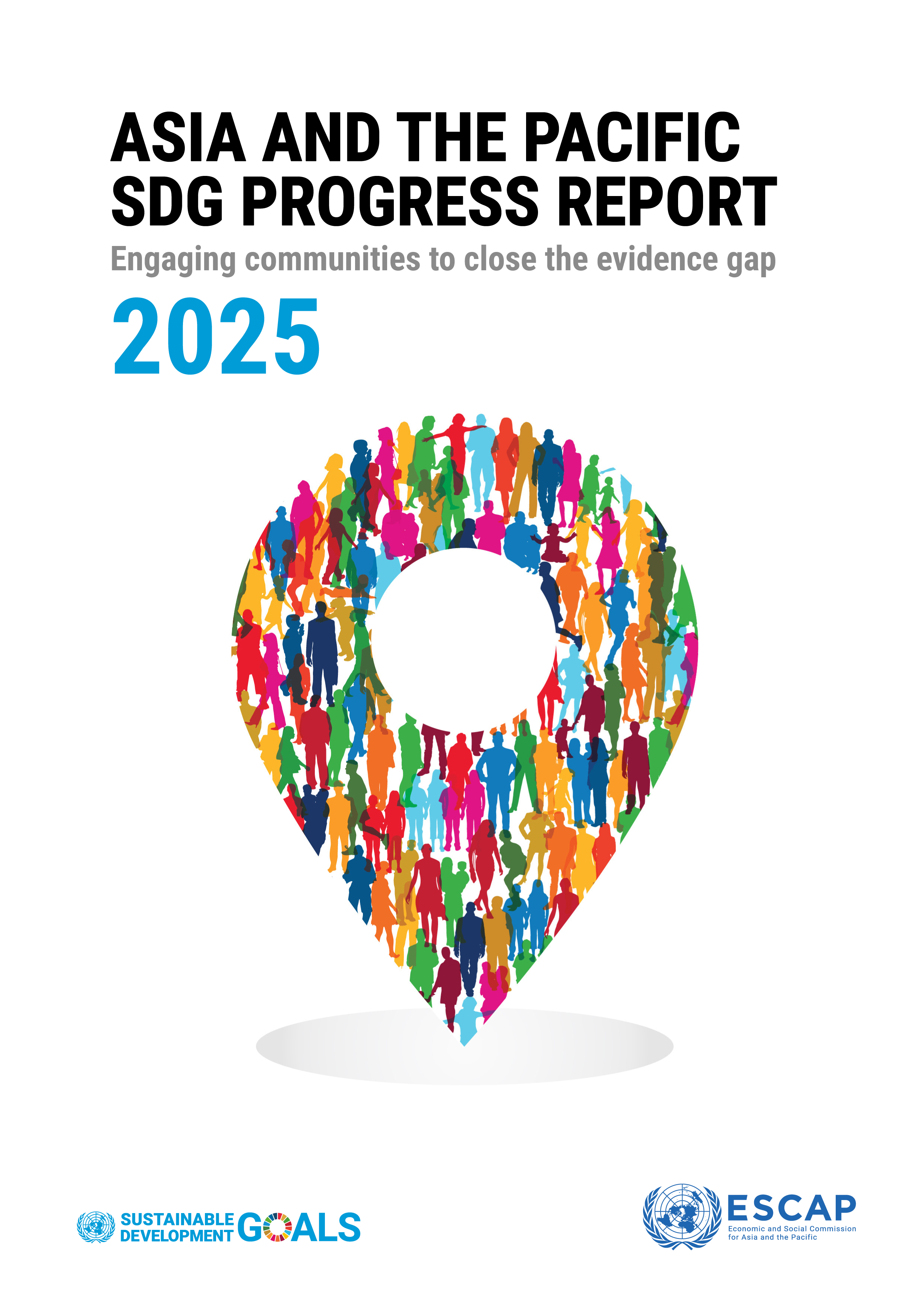
Asia and the Pacific SDG Progress Report 2025
Engaging Communities to Close the Evidence Gap
The SDG Progress Report for Asia and the Pacific 2025 provides a comprehensive assessment of the region’s progress towards the 17 Sustainable Development Goals and their 169 targets as well as the challenges and crises that are holding back progress in the region. Drawing on the latest data and insights, the report highlights successes, identifies persistent gaps, and offers actionable recommendations to accelerate progress. This year’s edition places a special emphasis on community-driven approaches to data collection and utilization, showcasing innovative examples. By exploring these localized strategies alongside broader regional trends, the report highlights the importance of inclusive, data-informed decision-making to drive sustainable development. A vital resource for policymakers, development practitioners, researchers, and civil society leaders, this report serves as both a diagnostic tool and a roadmap for action. With its in-depth analyses, practical case studies, and actionable insights, it contributes to the growing body of knowledge aimed at transforming global goals into tangible results for the people of Asia and the Pacific. Whether you are seeking to inform policy, guide implementation, or engage stakeholders in meaningful dialogue, this report provides the tools and evidence needed to make a difference.
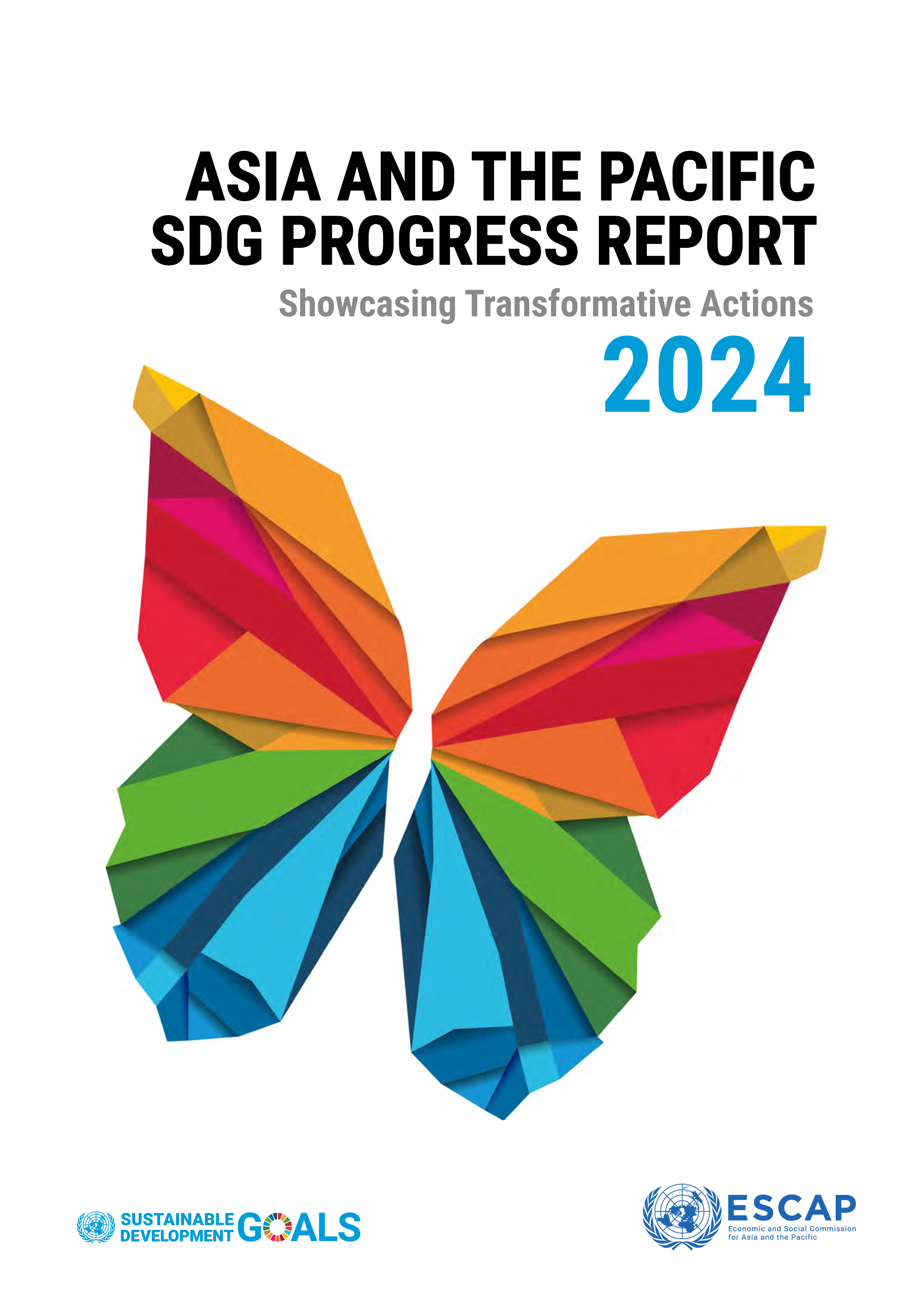
Asia and the Pacific SDG Progress Report 2024
Showcasing Transformative Actions
The Asia and the-Pacific SDG Progress Report 2024 is one of the annual flagship publications of the United Nations Economic and Social Commission for Asia and the Pacific (ESCAP). It provides an overview of SDG Progress in the region which serves as a foundation for many other activities conducted by ESCAP and our partners. This year, the report shines the spotlight on success stories and trends, and the unique challenges faced in the different parts of the region. It draws out the priorities and opportunities for enhancing data availability on SDG indicators, especially for the most vulnerable population groups, which could help shape more equitable and inclusive development pathways strategies.
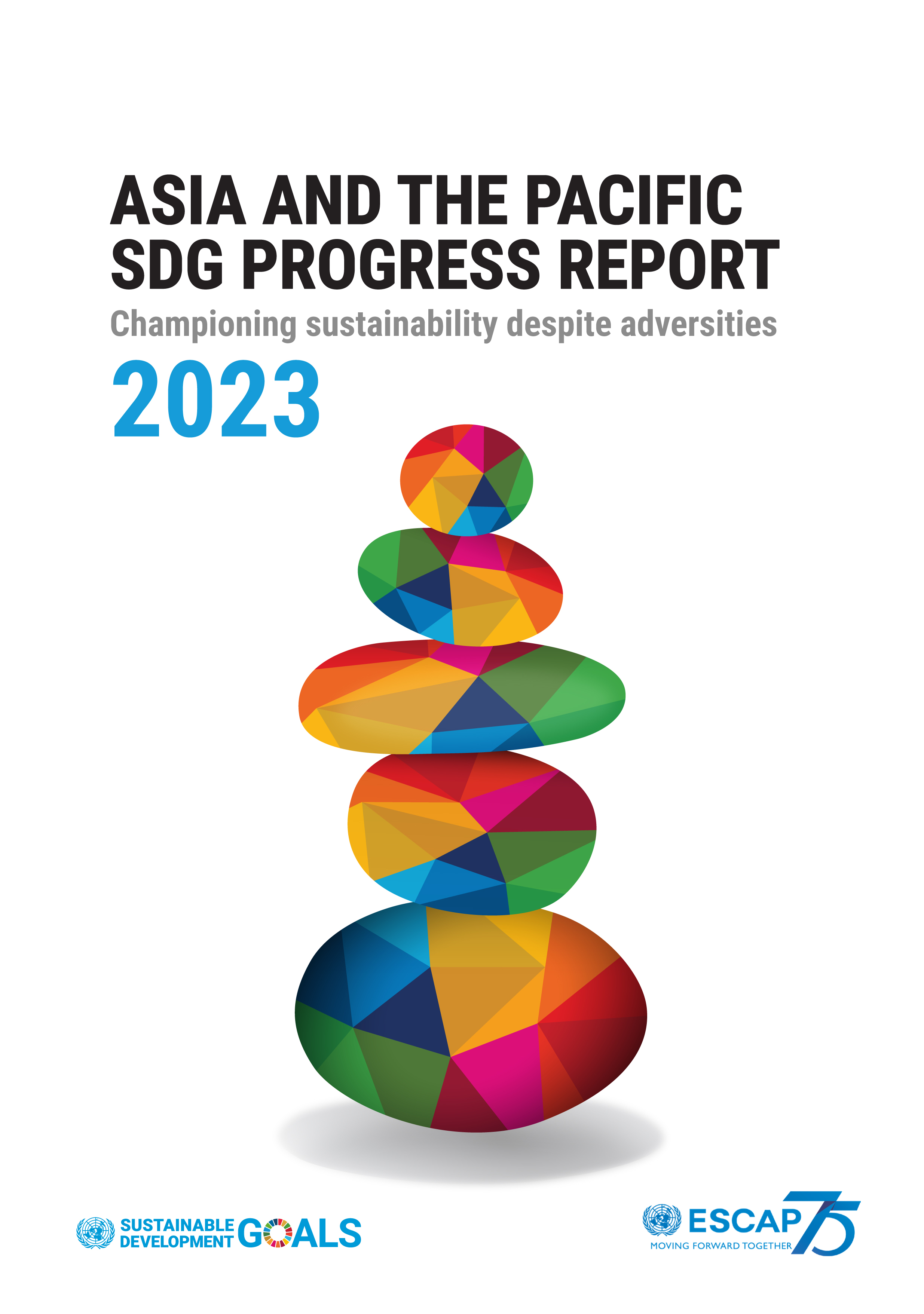
Asia and the Pacific SDG Progress Report 2023
Championing Sustainability Despite Adversities
The Asia and the Pacific SDG Progress Report 2023 analyses regional and subregional progress towards achieving the Sustainable Development Goals (SDGs) and targets. It applies a measurement framework developed by ESCAP to identify progress gaps and acceleration requirements at the goal, target and indicator levels. While there are impressive national accomplishments across the 17 Goals, none of the countries in the region are on track to reach them and overall achievement is much lower than anticipated for the midpoint. One impediment to success is gaps in available data. This report features good practices on data driven approaches for effective implementation of the 2030 Agenda, which provide lessons to countries and can be leveraged to advance sustainable development in the region.
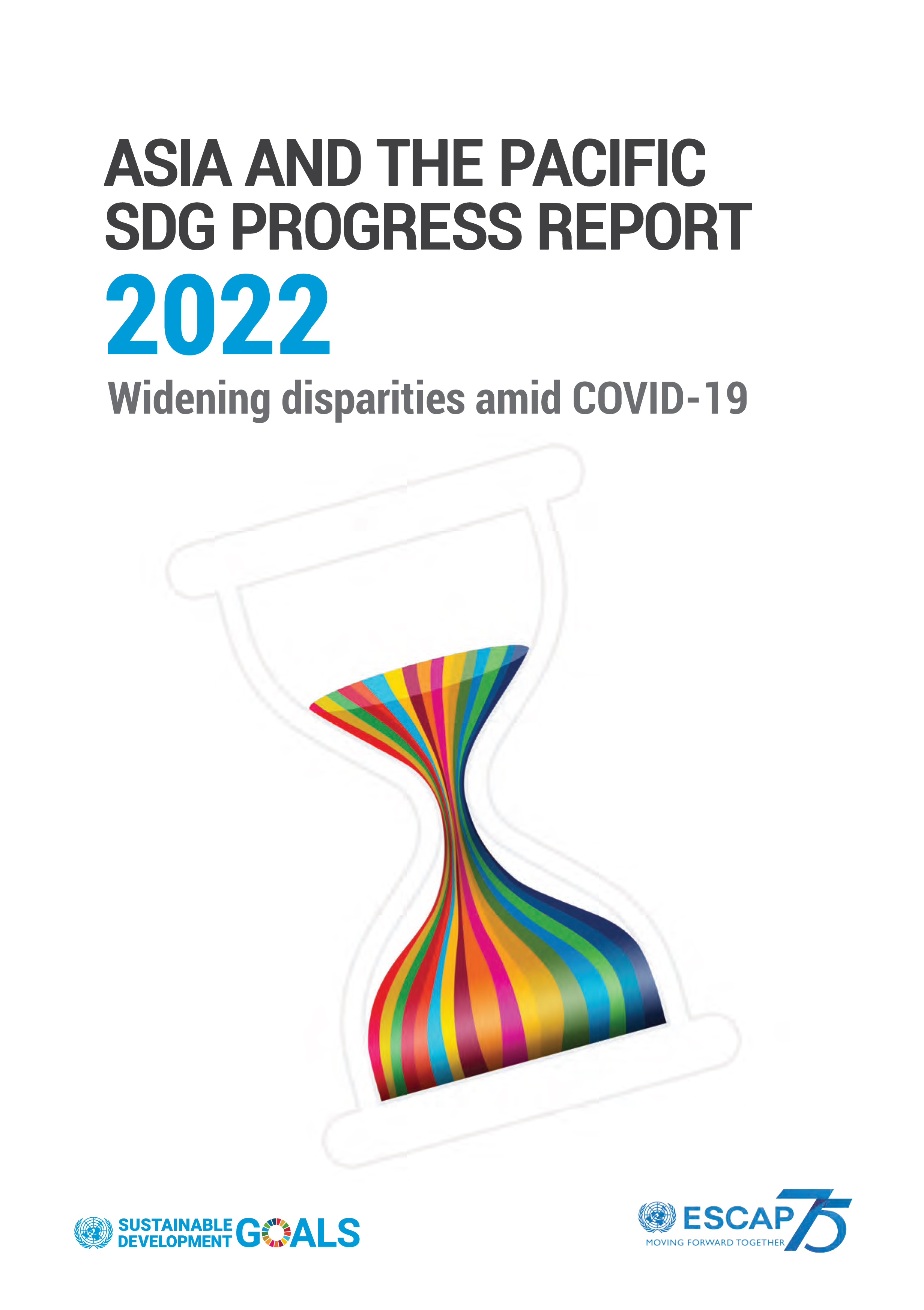
Asia and the Pacific SDG Progress Report 2022
Widening Disparities Amid COVID-19
The Asia and the Pacific SDG Progress Report 2022 analyses regional and subregional progress towards achieving the Sustainable Development Goals (SDGs) and targets. This publication applies a measurement framework developed by ESCAP to identify progress gaps and acceleration requirements at goal, target and indicator levels. On chapter 3 (Vulnerabilities and the pandemic: Risk of widening disparities), the report was developed in cooperation with UN agencies; ILO, IOM, UNDP, UNEP, UNESCO, UNFPA, UNHCR, UNICEF, UNODC, and UNWomen. The following topics are introduced in the report: Chapter 1 – Regional overview Chapter 2 – Around Asia-Pacific: Diverse progress across subregions Chapter 3 – Vulnerabilities and the pandemic: Risk of widening disparities Chapter 4 – Unpacking the SDG data gaps
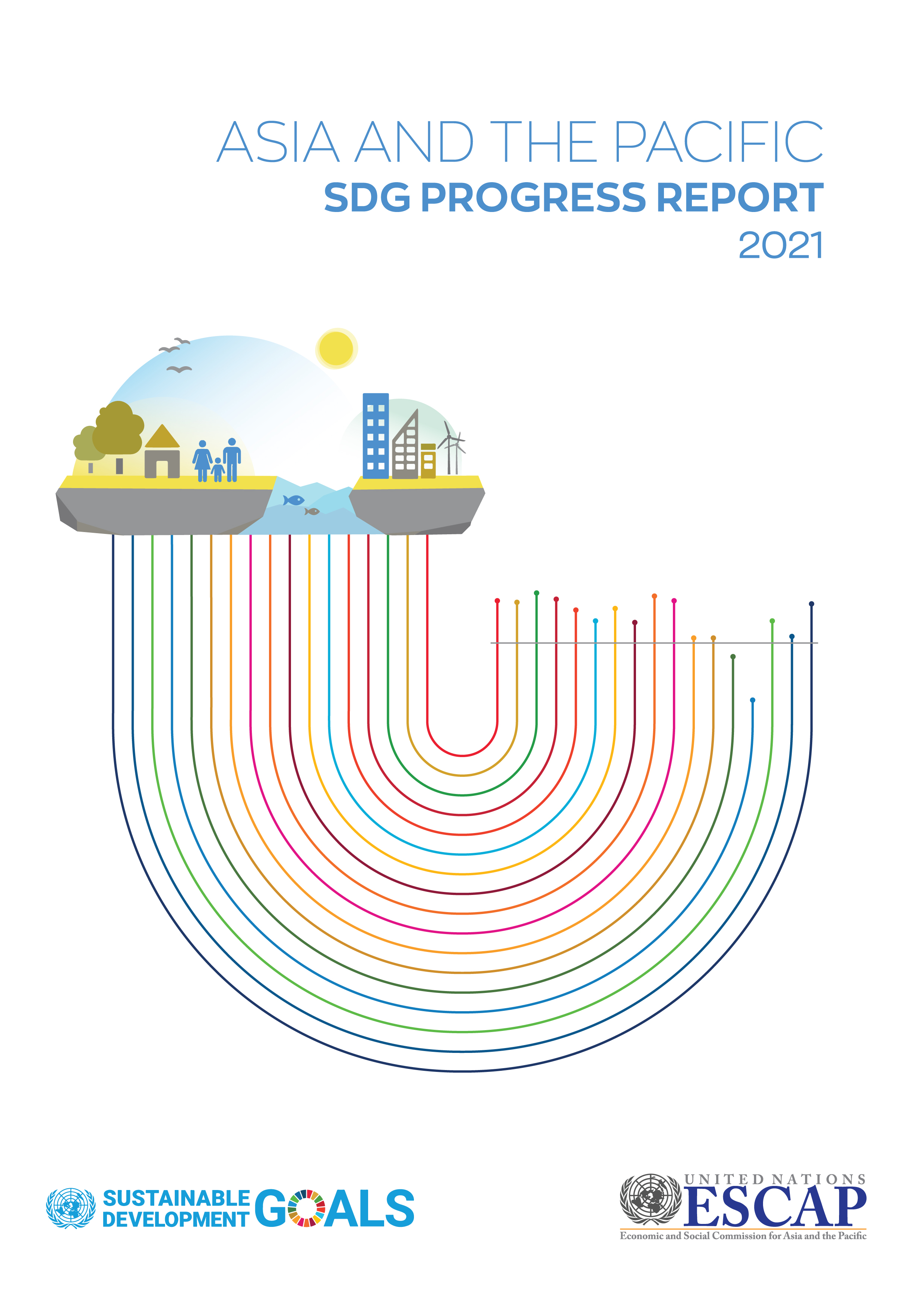
Asia and the Pacific SDG Progress Report 2021
The Asia and the Pacific SDG Progress Report 2021 analyses trends as well as data availability for monitoring progress toward the Sustainable Development Goals (SDGs) in Asia-Pacific and its five subregions. It assesses gaps that must be closed to achieve the goals by 2030. This assessment is designed to ensure that the region’s actions remain on target, shortcomings are addressed as they arise, and all interested parties remain engaged. This edition also explores the impact of COVID-19 on achieving the 2030 Agenda, with inputs from partner UN agencies.
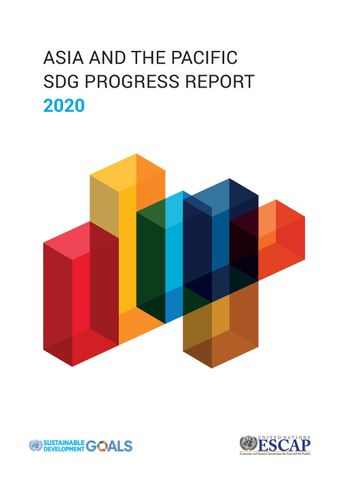
Asia and the Pacific SDG Progress Report 2020
This report analyses trends as well as data availability for monitoring progress toward the Sustainable Development Goals (SDGs) in Asia and the Pacific and its five subregions. It assesses gaps which must be closed to achieve the goals by 2030. This assessment is designed to ensure the region’s actions remain on target, shortcomings are addressed as they arise, and all interested parties remain engaged. It is an invaluable resource for all stakeholders involved in prioritization, planning, implementation and follow-up of the 2030 Agenda for Sustainable Development in Asia and the Pacific.
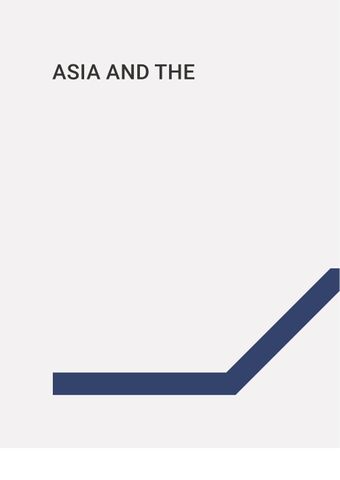
Asia and the Pacific SDG Progress Report 2019
The main objective of the Asia and the Pacific SDG Progress Report 2019 is to assess regional and subregional progress towards achieving the Sustainable Development Goals (SDGs) and targets. It will highlight areas of SDGs that the region has made progress and areas that need collective decisions for prioritizing acceleration or changing the trend. The report will complement other ESCAP SDG-related publications such as inequality theme study and SDG costing to inform deliberations at the Asia-Pacific Forum on Sustainable Development (APFSD), the Asia-Pacific Commission and subsequently in other occasions. The report also aim to provide an effective communication tool that foster inclusive regional consultations and effective engagement of the stakeholders including media and civil society. The report will utilize cross-nationally comparable data from ESCAP database on the proposed SDGs indicator framework and when necessary use supplementary statistics available at the regional and sub-regional levels. In addition to regional and subregional SDG progress analysis, the 2019 version of the regional SDG progress report will provide insights about data availability for SDG monitoring and identifies gapes and provides recommendations for investing in statistical development to fill in such gaps.
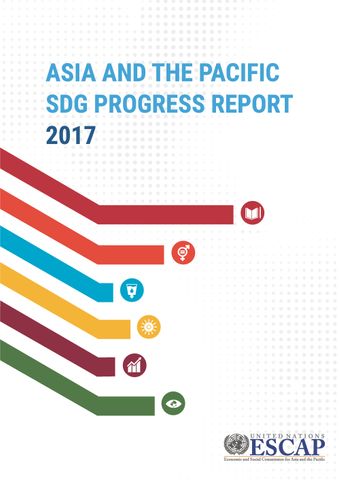
Asia and the Pacific SDG Progress Report 2017
This publication informs inter-governmental and inter-agency regional decision making in support of implementing the 2030 Agenda in the region. It highlights areas where progress has been made concerning Sustainable Development Goals (SDGs) and areas that need collective decisions for prioritizing acceleration or changing trends. It provides an effective communication tool to foster inclusive regional consultations and effective engagement of the stakeholders including media and civil society. The report uses cross-nationally comparable data from the ESCAP database on the proposed SDGs indicator framework as well as statistics available at the regional and sub-regional levels.
